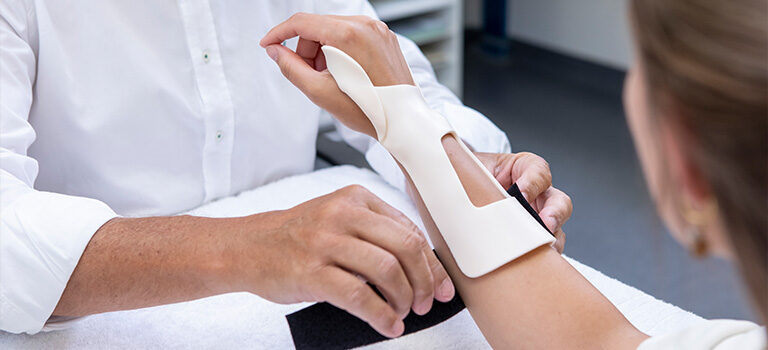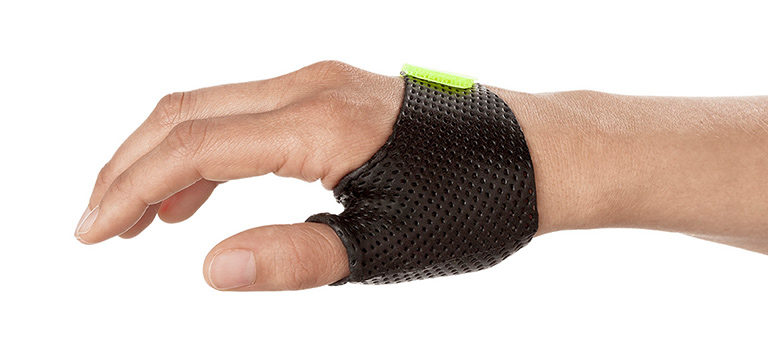
Tips for Wearing an Orthosis in the Summer
Keeping orthoses feeling fresh and comfortable
When we think about summer, we think about refreshing pool parties, exciting beach trips and long, warm evenings. These activities are all great fun but may bring some challenges to those who need to wear an orthosis.
Now that summer is in full swing, we like to share our top tips for keeping your patient’s orthosis summer-proof.

Via giphy.com
Dealing with Perspiration
Use a stockinette sleeve or a sock (with the toes cut off and a hole for the thumb) underneath the orthosis to absorb perspiration. Try socks made with moisture-wicking features to eliminate moisture.
Dealing with Water
Most thermoplastic orthoses can be worn while swimming, but need to be dried carefully afterwards. These are some additional swimming-related tips:
- Use lightweight or breathable material, such as Orfilight or Orficast, if you know the patient is either very active or will go to the beach/pool.
- Change the Velcro straps to dry ones so that nothing wet stays in contact with the skin.
- If possible, have the patient take off the orthosis when swimming or bathing. Ask him or her to pat the area dry completely before putting the orthosis back on.
- You can waterproof an orthosis by wrapping it in a couple of layers of plastic and sealing the edges with waterproof medical tape, or by using a waterproof product like a store-bought cast cover.
- A blow dryer set to a cool (not warm or hot or the material might melt) setting can be used to help speed dry the material.

Via giphy.com
Dealing with Itching
If the patient is experiencing itching underneath the orthosis, advise him or her not to scratch or use any sharp objects to do this. It is better to use an anti-itch cream to alleviate the problem.
Ask your patient to let you know if the skin is irritated or raw. They might need additional padding and protection from the thermoplastic material.
Dealing with Smells
Use a fabric refresher to eliminate bad smells and restore a fresh feeling to the orthosis, especially those orthoses fabricated from Orficast and Orficast More products.
Use a disinfecting wipe to clean hard thermoplastic orthoses.
Dirty orthoses can be machine washed in a clothing bag on a mild programme at max 30°C/86°F. If possible, the velcro should be removed before doing this.
Dealing with Heat
Instruct the patient to apply sunscreen on areas that are not covered by the orthosis.
Thermoplastic materials are sensitive to heat and should be protected from temperatures above 65°C/149°F. That’s why an orthosis should never be left in the car or in the sun for a prolonged period of time, otherwise, the material could melt and lose its shape. Such as in the picture underneath:
Dit bericht bekijken op Instagram
Share these tips with your patient, so they can keep their orthosis feeling fresh and comfortable; even in the heat of summer.
![]()

Written by Debby Schwartz, OTD, OTR/L, CHT
Physical Rehabilitation Product and Educational Specialist at Orfit Industries America.
Debby is a certified hand therapist with over 36 years of clinical experience. She completed her Doctorate of Occupational Therapy at Rocky Mountain University of Health Professions in 2010. She has worked at Orfit Industries America as Product and Educational Specialist since 2007.
Debby is also an adjunct professor at the Occupational Therapy Department of Touro University, School of Health Sciences, and at the Occupational Therapy Department at Yeshiva University, Katz School of Science and Health in NYC. She has written many book chapters in the field of hand therapy and multiple articles for hand therapy journals, including the ASHT Times and the Journal of Hand Therapy. She has published a new textbook on orthotic fabrication together with Dr. Katherine Schofield, entitled “Orthotic Design and Fabrication for the Upper Extremity: A Practical Guide”.
![]()

Co-written by Björn Le Roy, Occupational Therapist, BA
Björn was trained in orthotic fabrication by French Occupational Therapist, Jean Christophe Arias. In 2016, he began his Bachelor in Occupational Therapy which he successfully concluded in 2019.
Over the years, he has become an avid teacher of orthotic fabrication, giving numerous educational workshops across the world.
![]()
If you’d like to receive the latest product updates and interesting Orfit news, subscribe to our newsletter:



